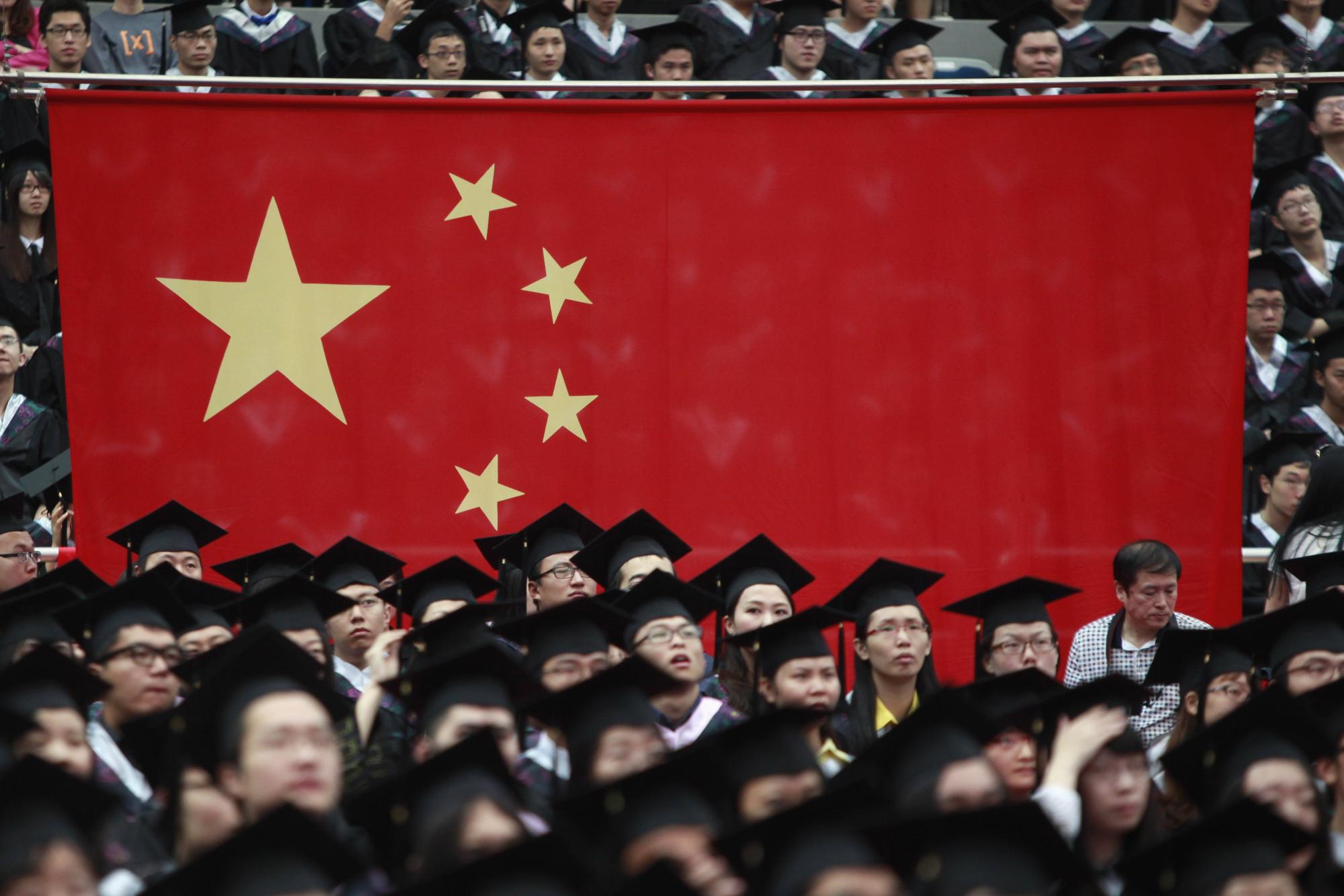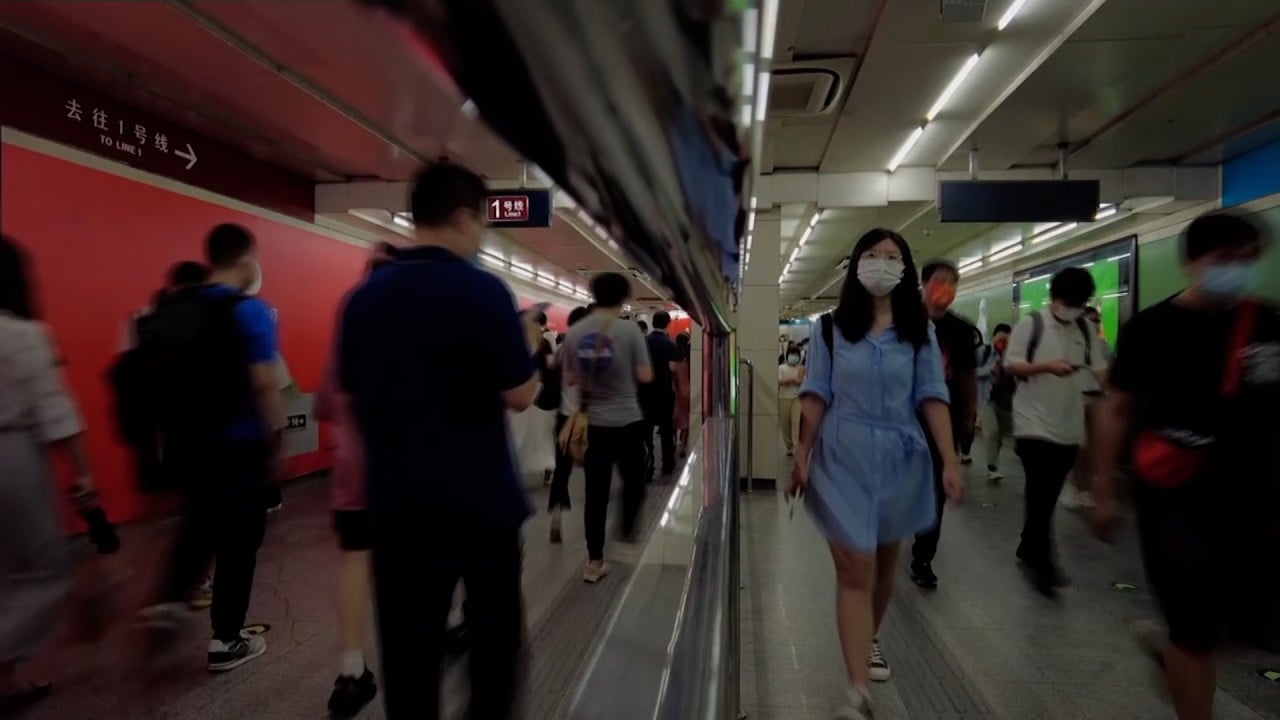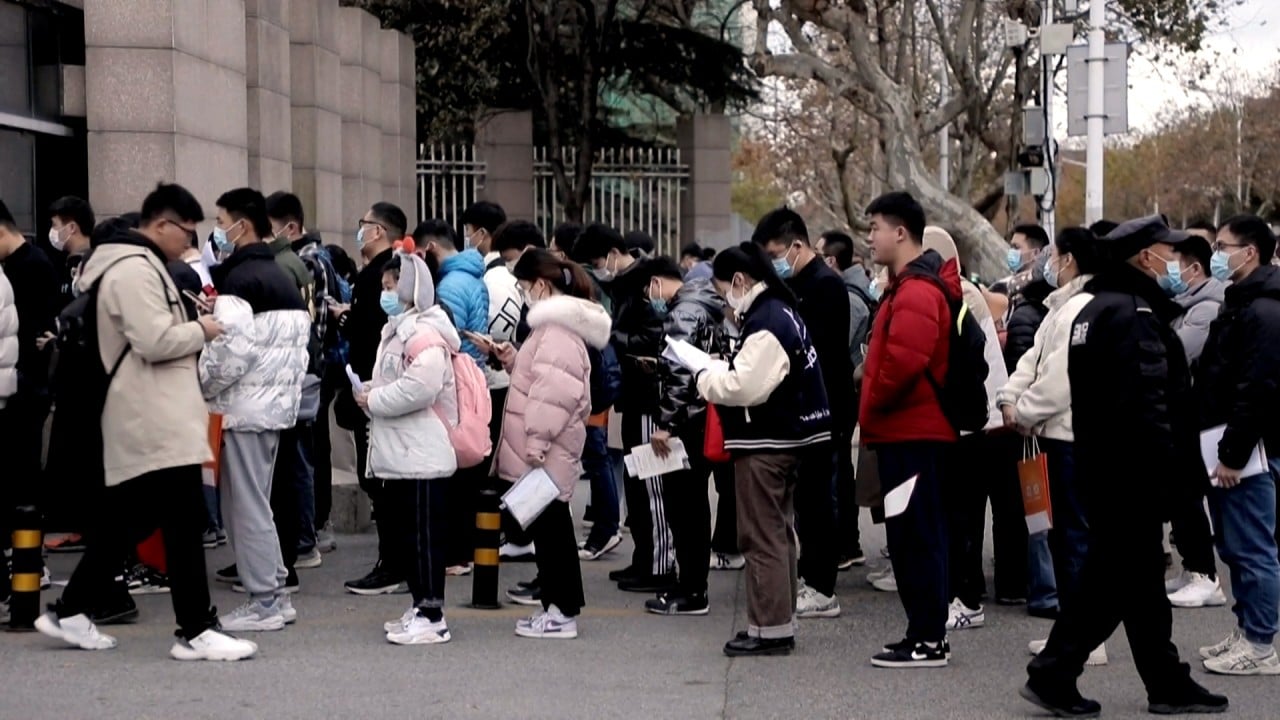
Young and out of a job in China: how Covid-19 is creating an unemployment crisis
- Youth unemployment rate rose from 15.3 per cent in January to 19.9 per cent in July as a record 10 million university graduates entered the job market
- Amid the ‘lying flat’ movement and pessimism among youth, President Xi pledges a fairer environment for everyone to take part in China’s rejuvenation
At the age of 21, after failing to find a job in China in the niche field of doing tricks with a football, he joined a gym as a fitness coach. Three years later, he lost that job.
“The business was on and off under Covid control measures,” Tong said. “I was not surprised to be sacked after the manager hinted several times the club had to cut costs.
“When the moment came last month, my brain went blank. After all, it was my first full-time job. Seconds later, the first thought coming to my mind was, ‘what am I gonna tell my parents’. They would take it terribly.”
“I told them it’s a universal thing,” Tong said. “In the end, they stopped blaming me and calling me a loser. And I gave my word to keep looking for a job. So far, I have not found one.”
China’s rising youth unemployment prompts fresh stability calls by Beijing
The Covid-19 pandemic has wreaked havoc on youth labour markets around the world. The number of young people globally who cannot find a job this year is set to reach 73 million – 6 million more than in the pre-Covid period, according to a report released by the United Nations’ International Labour Organization this month.
In the Asia-Pacific region, 14.9 per cent of young workers are expected to be still looking for a job by the end of the year, in line with the global average, the labour agency forecast.
China’s high youth unemployment rate can be attributed to the nation’s draconian Covid-19 control measures and a record number of university graduates entering the job market.
“Companies struggling amid the Covid pandemic are less capable of absorbing new workers. Meanwhile, the recovery of the service sector, a big source of youth employment, has been slow,” NBS spokesman Fu Linghui said earlier this month.
In the first seven months of the year, the services production index dropped 0.3 per cent from a year earlier. Tourism, hospitality and catering sectors were hit hard by Covid-19. In addition, private education and internet service companies laid off employees or curtailed recruits amid industry-wide crackdowns launched by the government.

Globally, first-time jobseekers, school dropouts and fresh graduates with little experience are always vulnerable in the job market – especially during a crisis.
More than a decade ago, many European countries, crippled by the debt crisis triggered by the US financial meltdown, plunged into the great recession.
In the European Union in 2009, unemployment hit young people the hardest in Spain, where youth unemployment rose to 37.8 per cent, Greece (25.8 per cent) and Italy (25.3 per cent) and soared to more than 40 per cent until 2014 before an economic recovery.
In the extreme case of Spain, the percentage of workers under 25 years of age and without a job topped 50 per cent in 2012, 2013 and 2014, as its GDP contracted by almost 9 per cent during the 2009–2013 period. As a result many Spaniards, mainly unmarried young adults, emigrated for work.
Even though China has not announced a timetable to phase out its Covid-19 control measures, job prospects for young workers are expected to remain gloomy, according to economists.
Qian Lan, 21, graduated from a college in the eastern city of Nanjing this summer. Before graduation, she worked for six months as a secretary in a furniture group purchasing company. She lost her job last month.
“As the Chinese saying goes, one should look for a horse while riding on a donkey. I’m that kind of person,” Qian said. Even after she secured a position with the group purchasing company, she kept looking around in the job market for a better employer, but with no luck.
“It’s extremely hard to find a decent job. Most companies are not interested in ‘green hands’. To those who do recruit fresh graduates, a bachelor’s degree seems to be a minimum requirement. My education background is not competitive at all,” she said.
China’s strict Covid measures take a big toll on youth mental health
She took comfort in the fact that at least she had found a job. However, the company collapsed last month after its prepayments to suppliers were lost when several furniture makers in the Yangtze River Delta had their production suspended amid the lockdowns.
Since then, Qian has sent her CV out about 100 times. So far she has heard from no one. “Every sleepless night, I stare at the ceilings and reflect on myself. I’m just unlucky, am I? My three years in college was shadowed by Covid. And Covid destroyed my job.
“I told myself someday, somehow I’ll find a job,” she said. “I’m not totally hopeless, right?”
Zhao Xiaoshan, 44, a migrant worker from the central province of Henan thinks his 18-year-old son is hopeless. Zhao senior became well off after working for 20 years in home decoration in Beijing. Last year, he picked up his son from his hometown for a reunion after he bought a small flat on the outskirts of Beijing.
“I think he should have a job. He is not interested in home decoration. So I arranged for him to work in a hair salon,” Zhao said.
Two months into the internship as an assistant, the salon stopped operating while Beijing tightened controls to curb an outbreak in May. One month later, the restrictions were removed, but because of a cash crunch the shop owner decided to close permanently.
“My son thought the job was tedious and refused to try another one,” Zhao said. “Nowadays, he spends most of the time on the bed playing video games, like those days when we were under home quarantine. He seldom speaks and often ignores me unless he needs something from me.
“I’m so worried he will be ‘lying flat’ forever.”
The Chinese government attaches great importance to employment, which matters significantly to social stability. China has vowed to create more than 11 million urban jobs this year and promised to keep the urban unemployment rate under 5.5 per cent. The rate was 5.4 per cent at the end of last month, according to the NBS.
What is ‘lying flat’, and why are Chinese officials standing up to it?
The government is also trying to encourage graduates to start their own businesses and state-owned enterprises to recruit more fresh graduates.
Lu Feng, an economist at Peking University, said to help address the youth unemployment problem, China could also introduce government-sponsored short-term work programmes and subsidise companies that provide internship opportunities for students.
He also recommended refining the zero-Covid policy. “Even if we stick to the basic principle of zero-Covid policy, partial improvement or making the most of the measures could help reduce the impact on the economy and be important and positive [for employment],” Lu said.




